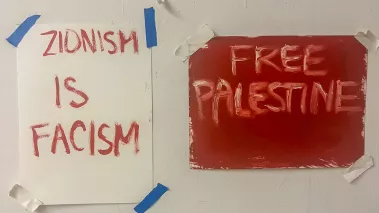Table of Contents
Brooklyn College silences pro-Palestinian student expression in misguided quest for campus peace

Morgan Patten
Two signs posted to the door of a graduate student's studio art space in the fine arts program at Brooklyn College.
College administrators may understandably fear disruption from the rancorous debate over the Israeli-Palestinian conflict on their campuses. After all, the conflict has long been a divisive issue, and has become even more so since the October 7 Hamas attacks on Israel and subsequent war in Gaza. Feelings are strong. Protests and demonstrations have taken place on campuses across the United States.
But administrators at public colleges and universities do not get to choose which debates come to campus. A generalized fear of disruption does not just justify censoring student expression based on content or viewpoint — a fact Brooklyn College administrators apparently fail to appreciate.
Brooklyn College student Morgan Patten expressed her support for the Palestinian cause by posting two signs on the door to her assigned studio space in the fine arts program: “Free Palestine” and “Zionism is fascism.”
Her signs remained on her studio door without incident for more than a month. But on Nov. 18, during a public “Open Studios” event where visitors may view students’ studio spaces and artwork, an anonymous individual reported Patten’s signs to campus police. Two officers promptly arrived to demand that she remove the signs because school policy does not allow posters on doors. Patten complied — but noticed the officers did not seek removal of any other posters or artwork on other doors nearby.

In late November, Patten learned of the escalation of the complaint about her signs to the college’s legal department, which confirmed school policy bars hanging any signs or posters on doors. But the legal department failed to explain why a broad policy ostensibly forbidding all posters on doors required Patten’s signs to come down but allowed posters and artwork on nearby doors to remain.
The chair of the art department, Mona Hadler, told Patten the primary concern was that she not hang her signs when she soon moves to a more centrally located studio space next to the administrative office and an art history classroom, because Hadler wants to keep the peace in the department. But, Hadler said, Patten might be able to get away with hanging a piece of artwork about war on her door.
On paper, Brooklyn College’s posting policy comports with the First Amendment by imposing reasonable, content-neutral time, place, and manner restrictions on posting in campus buildings. A public institution bound by the First Amendment like Brooklyn College may regulate speech based on when, where, and how it is delivered — by, for example, limiting noise levels at night or requiring student groups to hang posters on designated bulletin boards. But those reasonable restrictions must be viewpoint- and content-neutral, narrowly tailored to serve a significant government interest, and leave ample alternative channels for communication.
However, application of a seemingly neutral policy like Brooklyn College’s violates the First Amendment when used selectively to restrict particular content or opinions — as here when the college required removal of Patten’s two pro-Palestinian signs for no apparent reason other than their message.
On Dec. 7, FIRE sent Brooklyn College a letter calling on it to enforce its policies in a viewpoint-neutral manner. As we explained:
Demanding that Patten remove her signs, while allowing other posters on office doors in the same area to remain in place, is an impermissible content- and viewpoint-based restriction. . . . [T]he desire to quell potential disagreements in the art department [is not] a valid reason for selectively restricting Patten’s speech.
Allowing Patten to express pro-Palestinian sentiments through signs on her doors does not condemn the art department to unrest. Some disagreement is inevitable when students exercise free speech rights. Brooklyn College has the authority to discipline conduct that is actually disruptive. But it may not censor student speech on contentious topics to ensure peace on campus.
FIRE defends the rights of students and faculty members — no matter their views — at public and private universities and colleges in the United States. If you are a student or a faculty member facing investigation or punishment for your speech, submit your case to FIRE today. If you’re faculty member at a public college or university, call the Faculty Legal Defense Fund 24-hour hotline at 254-500-FLDF (3533). If you’re a college journalist facing censorship or a media law question, call the Student Press Freedom Initiative 24-hour hotline at 717-734-SPFI (7734).
Recent Articles
Get the latest free speech news and analysis from FIRE.

FIRE POLL: Americans overwhelmingly want free speech protected in AI regulation

You talkin’ to me? New York City official wants to turn yellow cabs into speech police.

Two Universities. Two Posters. One First Amendment Problem.



